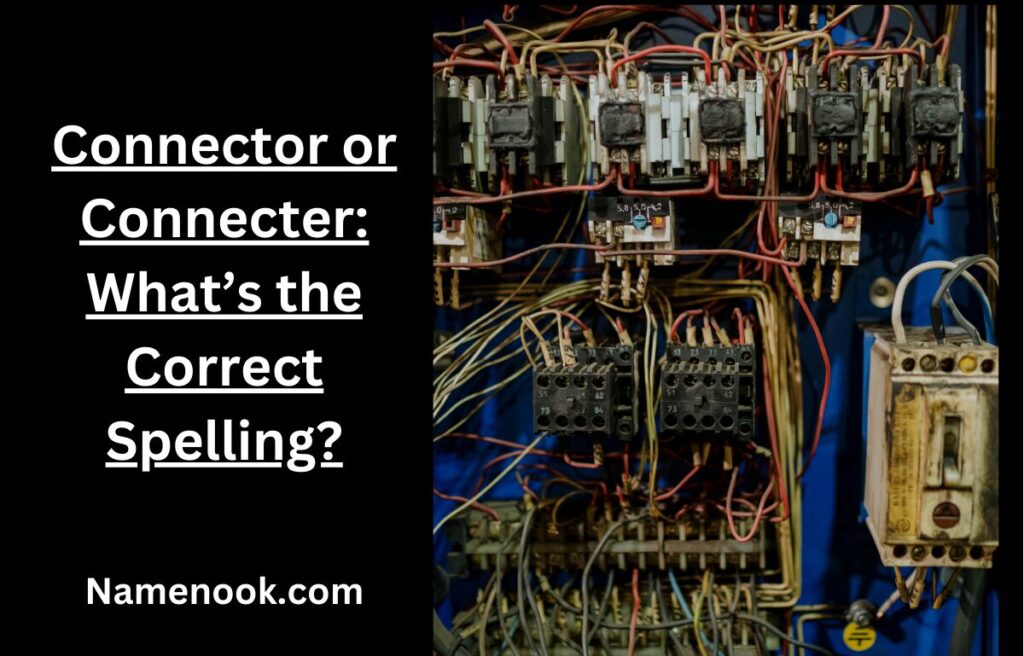“Connector” vs. “Connecter”: Which One Is Correct?
Wondering whether to use ‘connector’ or ‘connecter’? This guide explains the correct spelling, usage, and why ‘connector’ is the preferred modern term.
Language can be both fascinating and confusing, especially when similar-sounding words lead to uncertainty—even for experienced writers. One such pair that often causes hesitation is “connector” vs. “connecter.”
Although they sound nearly identical, only one is widely accepted in modern English. This guide will help you understand the difference, explore the origins of both terms, and show you how to use them correctly.
What Do “Connector” and “Connecter” Mean?
Before we dive into usage and history, let’s clarify what each word means.
What Is a “Connector”?
A connector is a noun used to describe something (or someone) that joins or links two or more things. It’s a versatile word that appears across different areas:
-
Technology: A device that joins hardware components, like a USB connector.
-
Social Settings: Someone who brings people together—“She’s a natural connector at networking events.”
-
Writing: Words or phrases that link ideas smoothly, like “however” or “in addition.”
What About “Connecter”?
Connecter is simply an old-fashioned spelling of connector. It used to appear more often in the past, especially in older texts, but it has since fallen out of favor and is rarely used today. While technically not incorrect, it’s no longer standard.
Quick Summary
-
Connector: The modern, correct, and widely accepted term.
-
Connecter: An outdated version that’s mostly obsolete.
So, Which One Should You Use?
Always go with “connector.” Whether you’re writing an email, report, article, or just chatting casually, “connector” is the right choice.
In Professional Contexts
Using accurate language matters in the workplace. For example:
“We need a reliable connector to ensure smooth integration between platforms.”
This sounds polished and professional—exactly what you want in business writing.
In Everyday Speech
The word works just as well in casual conversations:
“He’s such a great connector—he seems to know everyone!”
This makes your point clear and relatable.
Common Mistake to Avoid
Using “connecter” instead of “connector” is a simple mistake, often made by those unfamiliar with the spelling difference. But it can make your writing seem outdated or less polished. Stick with “connector” for clarity and credibility.
Example Sentences Using “Connector”
-
“The system needs a new connector that supports faster data transfer.”
-
“As a community leader, she acts as a connector between local businesses and nonprofits.”
-
“Using proper transition words serves as a connector between your essay’s paragraphs.”
Why “Connecter” Fell Out of Use
The decline of “connecter” comes down to how English spelling has evolved over time.
Historical Usage
In the 19th century, English was less standardized than it is today. Spelling variants like “connecter” were more common. However, as dictionaries and grammar rules became more influential, people began favoring more uniform spelling.
The Move Toward Standardization
By the early 20th century, English started to follow stricter conventions. Simpler, clearer words became preferred—“connector” won out because it looked more straightforward and was easier to recognize across different contexts.
Why “Connector” Is the Right Word (And Why “Connecter” Isn’t)
Where Things Stand Today
In today’s English, the word “connecter” is seen as outdated and is almost never used. Most trusted dictionaries and style guides either don’t list it or mark it as archaic. Instead, “connector” is the preferred and accepted form—whether you’re writing professionally or casually.
An Easy Way to Understand the Difference
To make things even clearer, think of this comparison:
-
Editor comes from the verb “edit.”
-
Connector comes from the verb “connect.”
Just like “editor” is someone who edits, a “connector” is something or someone that connects. This analogy helps show why “connector” fits naturally into modern English.
Related Words That Work the Same Way
-
Facilitator – Someone who helps a process run smoothly, like a connector of ideas or people.
-
Mediator – A person who helps others find common ground, essentially acting as a bridge.
These comparisons help show how “connector” fits with other nouns that describe roles or functions.
What the Experts Say
When you’re unsure about a word, checking a reliable source is always smart. Here’s what top references say:
-
Merriam-Webster: Lists connector as the correct term; “connecter” doesn’t even appear.
-
The Chicago Manual of Style: Advises against using outdated words like “connecter.”
-
Oxford English Dictionary: Recognizes “connector” as the standard spelling.
So if you’re looking for a word that’s accurate and professional, go with connector.
Where “Connector” Comes From
Understanding a word’s origin often helps you remember it. “Connector” has Latin roots:
-
Con- = together
-
Nectere = to bind or tie
So at its core, a connector is something that brings things together—and that’s exactly how we use it today.
How “Connector” Is Used in Real Life
Let’s look at a few everyday examples to see how “connector” fits into different situations:
1. Technology:
“The new update includes a connector that links all our devices.”
2. Social Situations:
“She’s a great connector—she always knows who to introduce to whom.”
3. Business:
“The connector between our sales and marketing teams is improving collaboration.”
4. Writing and Communication:
“Use connectors like ‘however’ or ‘therefore’ to make your ideas flow better.”
5. Education:
“Group activities act as connectors, helping students share and learn from each other.”
6. Networking Events:
“He’s known as a connector in the industry—he always introduces the right people.”
Synonyms You Can Use
Sometimes, you might want to say the same thing in a different way. Here are a few useful synonyms for “connector”:
| Synonym | Meaning |
|---|---|
| Link | A connection or relationship |
| Joiner | Someone or something that brings things together |
| Bridge | A metaphor for overcoming gaps |
| Coupler | A technical term for linking mechanical parts |
These can add variety to your writing while keeping your meaning clear.
Final Thoughts
If you’ve been wondering whether to use “connector” or “connecter,” here’s the bottom line:
👉 Use “connector.”
It’s the correct, modern term, and it works in every context—writing, speech, tech, social settings, and beyond. “Connecter” might still show up in old books, but it’s no longer considered standard English.
By sticking with “connector,” you’ll keep your writing sharp, professional, and in line with today’s language standards.
✅ Quick Reference Summary
| Topic | Details |
|---|---|
| Definitions | Connector: A device or person that links; Connecter: Archaic |
| Correct Usage | Always use connector |
| Historical Note | “Connecter” was more common in the 1800s |
| Word Origin | From Latin connectere (“to bind” or “tie together”) |
| Synonyms | Link, Joiner, Bridge, Coupler |
| Recommended Sources | Merriam-Webster, Oxford Dictionary, Chicago Manual of Style |




Hello,
for your website do be displayed in searches your domain needs to be indexed in the Google Search Index.
To add your domain to Google Search Index now, please visit
https://SearchRegister.info/